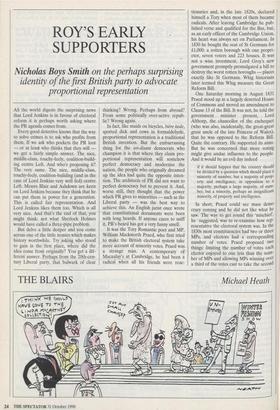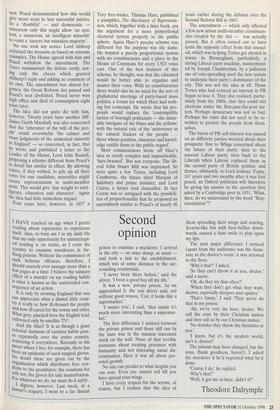ROY'S EARLY SUPPORTERS
Nicholas Boys Smith on the perhaps surprising
identity of the first British party to advocate proportional representation
AS the world digests the surprising news that Lord Jenkins is in favour of electoral reform it is perhaps worth asking where the PR agenda comes from.
Every good detective knows that the way to solve crimes is to ask who profits from them. If we ask who pockets the PR loot — or at least who thinks that they will we get a fairly simple answer. The nice, middle-class, touchy-feely, coalition-build- ing centre Left. And who's proposing it? The very same. The nice, middle-class, touchy-Feely, coalition-building (and in the case of Lord Jenkins very well fed) centre Left. Messrs Blair and Ashdown are keen on Lord Jenkins because they think that he can put them in power for a generation. This is called fair representation. And Lord Jenkins likes them too. Which is all very nice. And that's the end of that, you might think: not what Sherlock Holmes would have called a three-pipe problem.
But delve a little deeper and you come across one of the little ironies which makes history worthwhile. Try asking who stood to gain in the first place, where did the idea come from originally? You get a dif- ferent answer. Perhaps from the 20th-cen- tury Liberal party, that bulwark of clear thinking? Wrong. Perhaps from abroad? From some politically over-active repub- lic? Wrong again.
In fact, like maids on bicycles, biere tiede, spotted dick and cows in formaldehyde, proportional representation is a traditional British invention. But the embarrassing thing for the soi-disant democrats who champion it is that where they claim pro- portional representation will somehow perfect democracy and modernise the nation, the people who originally dreamed up the idea had quite the opposite inten- tion. The architects of PR did not want to perfect democracy but to prevent it. And, worse still, they thought that the power which PR gives to minorities — such as the Liberal party — was the best way to achieve this. An English jurist once wrote that constitutional documents were born with long beards. If anyone cares to sniff it, PR's beard has got a very funny smell.
It was the Tory Romantic poet and MP, William Mackworth Praed, who first tried to make the British electoral system take more account of minority votes. Praed was a strange man. A contemporary of Macaulay's at Cambridge, he had been a radical when all his friends were reac- tionaries and, in the late 1820s, declared himself a Tory when most of them became radicals. After leaving Cambridge he pub- lished verse and qualified for the Bar, but, as an early officer of the Cambridge Union, his heart was always set on Parliament. In 1830 he bought the seat of St Germans for £1,000: a rotten borough with one propri- etor, seven voters and 223 houses. It was not a wise investment. Lord Grey's new government promptly promulgated a bill to destroy the worst rotten boroughs — places exactly like St Germans. Whig historians later termed this Whig measure the Great Reform Bill.
One Saturday morning in August 1831 Praed stood up in a largely deserted House of Commons and moved an amendment to Clause 13 of the Bill. It was not, he told the government minister present, Lord Althorp, the chancellor of the exchequer (who was also, incidentally, the great-great great uncle of the late Princess of Wales), that he was opposed to the Reform Bill. Quite the contrary. He supported its aims. But he was concerned that more voting might give undue influence to the people. And it would be an evil day indeed if it should happen that the country should be divided by a question which should place a minority of number, but a majority of prop- erty and intelligence, in opposition to a majority, perhaps a large majority, of num- ber, but a minority, perhaps an insignificant minority, of property and intelligence.
In short, Praed could see mass demo cracy coming and he did not like what he saw. The way to get round this 'mischief, he suggested, was to re-examine how rep- resentative the electoral system was. In the 1830s most constituencies had two or three MPs, and electors had a corresponding number of votes. Praed proposed two things: limiting the number of votes each elector enjoyed to one less than the num- ber of MPs and allowing MPs winning over a third of the votes cast to take the second seat. Praed demonstrated how this would give more seats to less successful parties. In a 'doubtful' — and democratic tomorrow only this might allow 'an opu- lent, a numerous, an intelligent minority' to resist a 'sincere but mistaken majority'.
No one took any notice. Lord Althorp criticised the measure as based on extreme examples. The House agreed with him and Praed withdrew the amendment. The Times summarised the debate curtly, not- ing only the cheers which greeted Althorp's reply and adding no comment of its own. The amendment was almost for- gotten, the Great Reform Act passed and Praed's seat abolished. Praed never won high office and died of consumption eight Years later.
The idea did not quite die with him, however. Twenty years later another MP, James Garth Marshall, was also concerned that the 'utterance of the will of the peo- ple' could overwhelm 'the calmer and wiser judgments of the numerical minority in England' — so concerned, in fact, that he wrote and published a letter to the Leader of the House, Lord John Russell, proposing a scheme different from Praed's in detail but similar in effect. By allowing voters, if they wished, to pile up all their votes for one candidate, minorities might secure representation in multi-member seats. This would give 'due weight to intel- ligence, education and character'. Again the idea had little immediate impact. Four years later, however, in 1857 a Tory free-trader, Thomas Hare, published a pamphlet, The Machinery of Representa- tion, which, together with a later book, put the argument for a more proportional electoral system properly in the public sphere. Again Hare's precise scheme was different but the purpose was the same. He wanted a purely proportional system with no constituencies and a place in the House of Commons for every 1,923 votes cast. One of the best features of this scheme, he thought, was that the educated would be better able to organise and muster their votes. With no constituencies there would also be no need for the sort of gladiatorial meetings of party-based mass politics, a forum for which Hare had noth- ing but contempt. He wrote that his pro- posals would replace the 'contemptible tactics of borough politicians — the miser- able intrigues of the blues and the yellows' with the natural rule of the 'aristocracy as the natural leaders of the people . . . those whose position, character and knowl- edge entitle them to the public regard'.
Most commentators wrote off Hare's idea as overly complex and impracticable, `hare-brained'. But not everyone. The lib- eral John Stuart Mill was impressed. So were quite a few Tories, including Lord Cranborne, the future third Marquis of Salisbury and prime minister, and Lord Cairns, a future lord chancellor. In fact Cairns was so intrigued with the possibili- ties of proportionality that he proposed an amendment similar to Praed's of nearly 40 years earlier during the debates over the - Second Reform Bill in 1867.
The amendment — which only affected a few new urban multi-member constituen- cies created by the Act — was actually passed. But it often turned out to have quite the opposite effect from that intend- ed, which was helping Tories get elected in towns. In Birmingham, particularly, a strong Liberal party machine, mastermind- ed by Joseph Chamberlain, by a judicious use of vote-spreading used the new system to underpin their party's dominance of the city. This was not the idea at all. Those Tories who had evinced an interest in PR began to lose it. They also realised, partic- ularly from the 1880s, that they could win elections under the first-past-the-post sys- tem. Perhaps democracy was not so bad. Perhaps the rules did not need to be re- written to protect the people from them- selves.
The baton of PR self-interest was passed on as different parties worried about their prospects: first to Whigs concerned about the future of their party; then to the nascent Labour party; then back to the Liberals when Labour replaced them as the second party of British politics; and thence, ultimately, to Lord Jenkins. Today, 167 years and two months after it was first posed, an Oxford politician will therefore be giving his answer to the question first asked by a Cambridge poet in 1831, 'What, then, do we understand by the word "Rep- resentation"?'



















































































 Previous page
Previous page